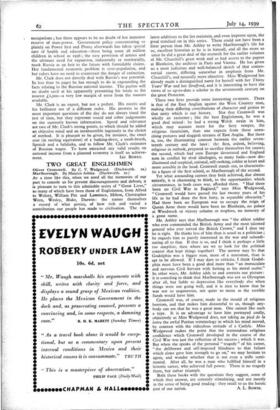TWO GREAT ENGLISHMEN
AT a time like this, when we need all the memories of our past to console us for present discouragements and defeats, it is pleasant to turn to this admirable series of " Great Lives," so many of which have been those of Englishmen, from Alfred to Wolsey, William Pitt and Lawrence, Milton, Christopher Wren, Wesley, Blake, Darwin: the names themselves a record of what genius, of how rich and varied a contribution our people has made to civilisation. The two
latest additions to the list maintain, and even improve upon, the good standard set in this series. There could not have been a fitter person than Mr. Ashley to write Marlborough's life for us, excellent historian as he is in himself, and all the more so since he did a great deal of the research for the earlier volumes of Mr. Churchill's great work and so had access to the papers at Blenheim, the archives in Paris and Vienna. He has given us a most judicious and well-balanced sketch of that contro- versial career, differing somewhat in emphasis from Mr. Churchill's, and naturally more objective. Miss Wedgwood has already made a distinguished name for herself with her Thirty Years' War and her Strafford, and it is interesting to have the views of so up-to-date a scholar in the seventeenth century on the great Protector.
These two lives provide some interesting coqtrasts. There is that of the East Anglian against the West Country man, making their differing contributions of character and genius to
that unity which is our history. Not that Cromwell was
wholly an easterner ; like the best Englishmen, he was a
good deal mixed: he had a strong Welsh strain in him, which may account more for the fiery temper, the religious fanaticism, than one expects from those unex- citing pastures and sluggish streams of East Anglia. But there
is, too, the illuminating contrast between the earlier seven-
teenth century and the later : the first, ardent, believing, religious in outlook, prepared to sacrifice themselves for causes; the second, which had seen Europe devastated and England torn in conflict by rival ideologies, so many fools—now dis- illusioned and sceptical, rational, self-seeking, colder at heart and more sensible in the head. Cromwell stands out, so characteris- tic a figure of the first school, as Marlborough of the second.
Yet what astounding careers they both achieved, due almost entirely, it is chastening to think, to the opportunities which circumstance, in both cases war, afforded them. " Had there
been no Civil War in England," says Miss Wedgwood, " Cromwell would have passed the last twenty years of his life as he had done the first forty, in reputable obscurity."
Had there been no European war to occupy the reign of Queen Anne there would have been no Blenheim, no palace at Woodstock or victory column or trophies, no memory of a great name.
Mr. Ashley says that Marlborough was " the ablest soldier who ever commanded the British Army and the most talented general who ever served the British Crown," and I dare say he is right. He thinks less of him than is usual as a politician ; he regards him as purely interested in the war and subordi- nating all to that. If that is so, and I think it perhaps a little too simpliste, then where are we to look for the political control that kept things together? The answer may be that Godolphin was a bigger man, more of a statesman, than is apt to be allowed. If I may dare to criticise, I think Godol- phin must have been a good deal more than " an immaculate and nervous Civil Servant with betting as his moral outlet." In other ways, Mr. Ashley adds to and corrects our picture: it is consoling to think that Marlborough was not so Olympian after all, but liable to depression like everybody else when things were not going well, and it is nice to know that he was not so ungenerous, not quite so mean as the terrible Sarah would have him.
Cromwell was, of course, made in the mould of religious heroism, and that makes him distasteful to us, though any- body can see that he was a great man. One cannot like such a type. It is an advantage to have him portrayed coolly, objectively as Miss Wedgwood does, not taking au pied de la lettre the awful Puritan terminology in which his mind moved, by contrast with the ridiculous attitude of a Carlyle. Miss Wedgwood makes the point that the tremendous religious confidence which Cromwell developed in the course of the Civil War was just the reflection of his success ; which it was. But when she speaks of the personal " tragedy " of his career, " the deliberate and self-imposed blindness to that failure which alone gave him strength to go on," we may hesitate to agree, and wonder whether that is not even a trifle senti- mental. After all, he was a man who fulfilled himself in a historic career, who achieved full power. There is no tragedy there, but rather triumph.
Both these books with the questions they suggest, some of which they answer, are certainly stimulating, and not merely in the sense of being good reading : they recall to us the heroic










































 Previous page
Previous page